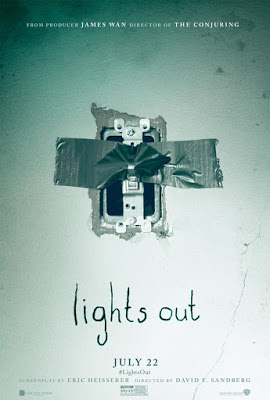Lights Out
A family is tormented by a ghost that only appears when the lights are off in Lights Out. Rebecca (Teresa Palmer) is a woman who has been estranged from her mentally ill mother Sophie (Maria Bello) for sometime. However, she arrives to help out her younger brother Martin (Gabriel Bateman), who hasn’t been getting sleep at night. It turns out that Martin has been seeing a shadowy figure named Diana (Alicia Vela-Bailey), who also tormented Rebecca when she was younger and seems to have ties to Sophie’s past. Rebecca and her boyfriend Brett (Alexander DiPersia) attempt to intervene and protect their family from this threat that resides in the dark.
Lights Out is the feature film debut for filmmaker David F. Sandberg, which is is expanded from his 2013 short film of the same name. Running at just under three minutes in length, the original Lights Out short film establishes the intriguing premise of a ghost that is only visible in the dark, yet keeps moving in the light. With it building up to a jump scare punchline, the short ends up being pretty effective and doesn’t really overstay the premise.
The short apparently attracted the attention of James Wan (Insidious, The Conjuring), who came on board to produce this feature-length expansion. However, it has to be said that something was lost in translation and that Lights Out the feature film has nothing much to differentiate itself from the cliched films that make up the bulk of the mainstream horror market. I can almost list off all the tropes Lights Out uses: Young female lead, preferably with blonde hair? Check. Troubled child? Check. Boyfriend, who may or may not find himself in the most danger? Check. Unnecessary exposition that makes threat less scary? Check. PG-13 rating that tones down the content of the film, yet ensure teens can use their disposable income to see it? Double check!
I’m not sure if the blame for Lights Out‘s very cliched translation from short to feature should be placed on David F. Sandberg himself or on screenwriter Eric Heisserer, who is probably best known for Final Destination 5 and the 2011 reboot of The Thing. The film admittedly does have some fun with the premise, particularly in the climax of the film. However, Lights Out didn’t need to explain every aspect of why this ghost is tormenting this family. Additionally, there is the performance of Maria Bello as Rebecca’s depressed mother Sophie, which is balancing on a really fine line when it comes to the depiction of people with mental illness on film. While it has been a staple of the horror genre for decades, in light of recent efforts to destigmatize mental illness, something just doesn’t feel right that the mentally ill person in the film is often acting crazy and unhinged, even if this is due to the ghost’s influence.
After hearing great things about the original short film, I went into Lights Out hoping that it will be one of the few original horror films to get a mainstream release. However, something was definitely lost in translation and the film is just yet another cliched shockfest.
 WATCHABLE
WATCHABLE 
